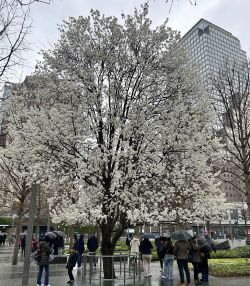May President's Column -(continued)
The losses of funding, programs, and jobs can be abrupt, impersonal, and inexplicable. Actions often seem to be arbitrary, capricious, and lacking a clear objective. Some cuts and freezes are reversed just as abruptly as they were implemented, adding to the unpredictability. The result is an atmosphere of chaos, confusion, uncertainty, distress, and fear. Some of us are directly caught up in the middle of that storm, some of us are on the periphery of it, and some of us are fortunate to be watching it from what is, for now, a safe distance.
One of the most pernicious aspects of all of this is the vilification of science, education (especially higher education), and environmental protection. As natural resource educators, this hits us particularly hard. It strikes deep at the core of our personal and professional values. It mocks and maligns that which we work hard and sacrifice for. We know the value of objective, research-based education. We see firsthand every day how our work empowers people to improve their lives, communities, and environment. We are witnesses to the tremendous return on public investment that our work yields for our universities, communities, states, and nation. To see the calumny that falsely accuses the solutions of being the problems is beyond dismaying.
As we try to navigate this upside-down time of loss, upheaval, uncertainty, and anxiety, it is not likely that we have yet reached the nadir of this bogus journey. We do not know what, where, or when that point will be. What we do know, though, is that it will not be the end of our story. We know that we will adapt, grow, persevere, and prosper. We often teach about resilience in the context of natural systems. Let us also be characterized by resilience.
I am acutely aware of the disparity between the ease of writing these words and the reality of living them out, especially when there is so much that we cannot control. A trite vision of a fairy tale ending will seem pretty tone-deaf if you are facing the loss of your funding, your program, and/or your job. Extension is not a typical 9-to-5 endeavor. It is a passion and a lifestyle, and the programs we build are labors of love. As such, our work can become part of our identity and the loss of it can be devastating. It is not abstract – it is deeply personal.
My expression of confidence in our resilience and our future is not to minimize our individual or shared challenges. Nor is it to deny the need to grieve loss. Rather, it is an exhortation to not lose hope in the process. Martin Luther King Jr. said, “We must accept finite disappointment, but never lose infinite hope.” These are deeply disappointing times. Hope is what pushes us forward and inspires us to be our best despite the circumstances. It is an acknowledgment that this too shall pass. This does not mean that we should be passive, though. “This too shall pass” should not be confused with “c’est la vie.” To do so would conflate hope with apathy. Hope is active. We may need to be patient in our hope, but we should not be passive. There is much that we cannot control, but that does not relieve us of a duty to leverage that which we can control.
Active hope means continuing to do the exemplary work that we do. I congratulate all of our 2025 ANREP Awards Program winners, who are a testament to the outstanding work that our members do. Continue to do what you do best, which is to innovate; build and reinforce partnerships; create and recognize opportunities; broaden your audience; provide accessible, high-quality programs; and bring your passion to work every day.
Desmond Tutu said, “Hope is being able to see that there is light despite all of the darkness.” We do not have to look far to see a lot of darkness. We also do not have to look far to see light. We carry light in what we do every day as natural resource Extension professionals. When we unlock knowledge of the natural world and deepen people’s understanding and wonder, we bring light. When we inspire and empower people to care for the forests, the grasslands, the waters, and all that live within them, we bring light. When we see the people we serve take what we teach and put it into practice, light goes forth and multiplies. What we do matters, and in times when the ideals of education and conservation are rejected by many, what we do matters all the more.
 Do not hide the light that you bring. You have an amazing story – tell it! Tell the story of your program and your impacts. Tell the story of your partnerships and innovations. Tell the story of the people you serve. Tell the story of your return on investment. Tell the story of Extension and the Land Grant mission. Tell your story to university administrators. Tell your story to county commissioners and council members. Work with your institution to tell your story to state legislators and federal representatives. The world is run by those who show up, so we need to show up consistently and make sure our stories are told, because they are worth telling. Do not be reduced to a line item on a budget. Make sure that decision makers know the faces, stories, and impacts that those line items represent. Make sure they know how bodacious you, your team, and your program are.
Do not hide the light that you bring. You have an amazing story – tell it! Tell the story of your program and your impacts. Tell the story of your partnerships and innovations. Tell the story of the people you serve. Tell the story of your return on investment. Tell the story of Extension and the Land Grant mission. Tell your story to university administrators. Tell your story to county commissioners and council members. Work with your institution to tell your story to state legislators and federal representatives. The world is run by those who show up, so we need to show up consistently and make sure our stories are told, because they are worth telling. Do not be reduced to a line item on a budget. Make sure that decision makers know the faces, stories, and impacts that those line items represent. Make sure they know how bodacious you, your team, and your program are.
Finally, support one another. Resilience does not happen by accident, and we do not thrive on our own. Last month I visited New York City for the first time. While I was there, I visited the 9/11 Memorial. I remember vividly the day the towers fell, and gazing into the reflecting pools was an emotional experience. What struck me the most, though, was the Survivor Tree. This broken and burned Callery pear tree was found in the rubble. It was restored to health by the New York City Department of Parks and Recreation at their local nursery. In 2010, it had recovered enough to be returned to the World Trade Center site and planted at the memorial. When I saw the tree, it was the only one in bloom, standing out from all the others with its showy white blossoms. It was an icon of resilience made possible by years of care and nurturing.
Support and connect with one another. That is ultimately what our association is for. Join us at our annual meeting on the 21st to celebrate our successes as individuals and as an organization. Get involved in your region. Join a committee or initiative. Meet more of your colleagues to share ideas and encouragement. In other words, be excellent to each other (and party on…).


 Do not hide the light that you bring. You have an amazing story – tell it! Tell the story of your program and your impacts. Tell the story of your partnerships and innovations. Tell the story of the people you serve. Tell the story of your return on investment. Tell the story of Extension and the Land Grant mission. Tell your story to university administrators. Tell your story to county commissioners and council members. Work with your institution to tell your story to state legislators and federal representatives. The world is run by those who show up, so we need to show up consistently and make sure our stories are told, because they are worth telling. Do not be reduced to a line item on a budget. Make sure that decision makers know the faces, stories, and impacts that those line items represent. Make sure they know how bodacious you, your team, and your program are.
Do not hide the light that you bring. You have an amazing story – tell it! Tell the story of your program and your impacts. Tell the story of your partnerships and innovations. Tell the story of the people you serve. Tell the story of your return on investment. Tell the story of Extension and the Land Grant mission. Tell your story to university administrators. Tell your story to county commissioners and council members. Work with your institution to tell your story to state legislators and federal representatives. The world is run by those who show up, so we need to show up consistently and make sure our stories are told, because they are worth telling. Do not be reduced to a line item on a budget. Make sure that decision makers know the faces, stories, and impacts that those line items represent. Make sure they know how bodacious you, your team, and your program are.